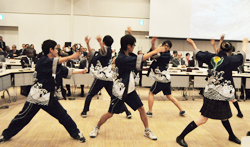Japan’s youth need tropical forests
5 November 2012

Students from Yokohama Science Frontier High School (YSF) perform a traditional dance at the symposium. Photo: K.Sato/ITTO
At the opening of the event, ITTO’s Executive Director Mr. Emmanuel Ze Meka explained the important issues that will be dealt with by ITTO under the ITTA 2006 – such as strengthening work on biodiversity conservation in tropical forests and promoting the role of tropical forests in combatting climate change. The symposium heard messages from a distinguished panel of speakers. Japan’s Ambassador for Global Environmental Affairs Masahiko Horie highlighted the importance of tropical forests in the global environment and his country’s support for ITTO in its mission to conserve and sustain these forests. The Minister of Forestry and Wildlife from Cameroon, Mr. Philip Ngole Ngwese, stressed the importance of Africa’s forests in providing environmental services like biodiversity conservation and sequestering carbon, calling on the international market to provide equitable remuneration for such services. Senator Jorge Viana of Brazil reviewed his country’s progress in reducing deforestation and improving forest management, recognizing ITTO’s assistance to Brazil and his home state of Acre. Sarawak’s Chief Minister Abdul Taib Mahmud highlighted the changes in his state’s forest management policies since a groundbreaking ITTO mission in 1989, noting the challenges of achieving sustainable forest management.
A highlight of the symposium was a performance by students from Yokohama Science Frontier High School (YSF). With a shout of “Kamae!” – a Japanese word used in martial arts and traditional theater to assume position - the students proceeded with an opening performance of “Soran Bushi”, a traditional work song commonly sung by the fishermen of northern Japan about a century ago often performed in Yokohama at festivals. The dance performance was a reminder to everyone in attendance of Yokohama’s historical significance as a port city.
“We, the Japanese, have the tradition to thank the riches of the ocean. The riches of the ocean interrelate with the riches of the forest. Since we live in Yokohama, the thick of the city, we tend to be unaware of the effects the forest has on our daily lives. We must not forget this. Now is the time for us to think about what we can do to protect our local forests as well as all forests because as we have learned the earth’s systems are deeply interdependent”, said student Yuko Inoue.
After the dance performance, the students introduced YSF which has special status in Japan as a city-funded public high school emphasizing science literacy and advanced technology. YSF has established affiliations with universities, institutions and corporations to promote collaboration with scientists and academics. ITTO began a series of information-sharing meetings with first-year students from the social entrepreneurship club at Yokohama Science Frontier High School earlier this year which led to their interest and involvement in the Organization’s work.
Student Haruka Shiroi recalled that she and her classmates had “learned about [tropical forest issues] as part of our independent study that we began last summer, after having our first meeting at ITTO to discuss themes and issues affecting forests.” They studied issues affecting tropical forests in Africa, Latin America and Southeast Asia and the Pacific, including community forestry, sustainable forest management (SFM), forest law enforcement and governance and forest biodiversity. The students also learned about Japan’s forests in order to develop an understanding of differences and similarities between tropical and temperate forests. ITTO’s work to help conserve the Emerald Triangle trans-boundary forest region shared by Cambodia, Laos and Thailand was an important focus of the students’ studies. YSF student Mihoko Harada noted: “Such complex and rich natural forests do not exist in Japan. Since we do not grow up surrounded by this rich natural environment, we don’t understand the full importance of this resource. We also have to imagine what the issues are when countries and people have land borders [since Japan has none].”
The students at YSF also had a chance to highlight their learning on tropical forests at “Yokohama Kokusai Festa”, an annual public outreach event to promote cultural exchange and better understanding of global issues that took place in October 2012. At the ITTO Event Booth, the students presented ITTO projects taking place around the world using “kami-shibai”, the Japanese tradition of storytelling accompanied by illustrations that are usually made by hand, in front of thousands of visitors. The students informed the symposium that this experience had highlighted for them the lack of understanding and awareness that most Japanese have about forests and forest issues. Ms. Inoue provided perspective by adding: “Although we live in the city, as we’ve found out over the last couple of months, our environments [and] our lives are intricately entwined with forests. The forest plays a significant role in our lives, therefore, we must do what we can to sustain them.”
ITTO has pioneered advancements in policies to improve management of tropical forests and implemented important field work to implement these policies. In this regard, ITTO recognizes the role of Yokohama Science Frontier High School in its training of a new generation of Japanese students for global careers as ethical, competent, and visionary scientists and professionals—some of whom will hopefully advance the cause of tropical forests. The Organization is seeking funding to continue implementation of a Children’s Environmental Education Program, which will help to motivate youth in Japan and elsewhere to become interested in tropical forest issues as the YSF students have. Student Masaya Sakamoto reflected this ambition in his closing remarks to the symposium: “As we did in the Yokohama Festa, we will keep on spreading the information about the forest and its importance to people we meet and encourage younger generations—younger than us—to get involved.”
To read local coverage of the ITTO symposium “Renewed Opportunities and Challenges for the Future of Tropical Forests” published on 6 November 2012 in the Sankei Shimbun newspaper, please visit: http://sankei.jp.msn.com/region/news/121105/kng12110521010008-n1.htm
Photos
November 5 2012 Photos [zip]
November 6 2012 Photos [zip]
November 7 2012 Photos [zip]
November 8 2012 Photos [zip]